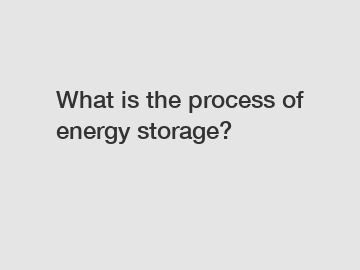What is the process of energy storage?
Have you ever wondered how energy can be stored for later use? The process of energy storage is crucial for maintaining a steady supply of electricity and ensuring that power is available when it is needed most. In this article, we will explore the different methods and technologies used for energy storage.
Batteries: A Popular Choice for Energy Storage.
One of the most common methods of energy storage is through the use of batteries. Batteries store energy in the form of chemical energy, which can then be converted into electrical energy when needed. These rechargeable devices are used in a wide range of applications, from powering our smartphones and laptops to storing electricity generated from renewable sources like solar panels and wind turbines.

There are many different types of batteries available, each with its own set of advantages and limitations. Some of the most popular types of batteries used for energy storage include lithium-ion, lead-acid, and nickel-cadmium batteries. These batteries vary in terms of their energy density, cycle life, and cost, making it important to choose the right type of battery for each specific application.
Pumped Hydro Storage: Harnessing the Power of Gravity.
Another common method of energy storage is pumped hydro storage. This technology involves storing energy by pumping water uphill to a reservoir when electricity is abundant, and then releasing the water downhill through turbines to generate electricity when it is needed. Pumped hydro storage is a cost-effective and efficient way to store large amounts of energy over long periods of time.
Other Methods of Energy Storage.
In addition to batteries and pumped hydro storage, there are other methods of energy storage available. These include flywheel energy storage, compressed air energy storage, and thermal energy storage. Each of these technologies has its own unique advantages and applications, making them suitable for different types of energy storage needs.
The Future of Energy Storage.
As the demand for renewable energy sources continues to grow, the need for effective energy storage solutions is also increasing. Researchers and engineers are constantly working to develop new and improved methods of storing energy, such as advanced battery technologies, supercapacitors, and hydrogen storage systems. These innovations will play a key role in enabling the widespread adoption of renewable energy sources and ensuring a reliable and resilient energy supply in the future.
In conclusion, the process of energy storage is essential for ensuring a stable and reliable supply of electricity. Whether through batteries, pumped hydro storage, or other methods, energy storage technologies play a crucial role in balancing supply and demand in the power grid. By understanding the different methods of energy storage and their applications, we can work towards a more sustainable and efficient energy system for the future.
If you have any questions about energy storage technologies or are looking for a reliable supplier of energy storage solutions, please contact us for more information. We are here to help you find the right storage solution for your specific needs.
For more information, please visit DIY Lifepo4 Battery Pack, DIY Lifepo4 Battery Kit, Outdoor Cabinet Battery Energy Storage System.
179
0
0


Comments
All Comments (0)